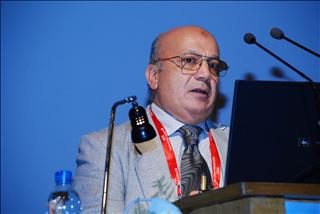Save the date 20-22 April 2018

Speaker Details
|
|
|
|
Biography |
|
|
 Prof. Salah Hassouna is an Emeritus Professor of Industrial and Environmental Microbiology at the Environmental Studies Department, and the Executive Director for the Quality Assurance and Accreditation Unit at the Institute of Graduate Studies & Research [IGSR], Alexandria University, Egypt . He served as Executive Director of UNARC (2003-2006) and as Vice-Dean of IGSR for Environmental Affairs and Community Development (2004-2006). His main research interests are fermentation technology, biofuels and waste management. He is an author of several papers as well as he supervised more than 60 graduate students on these subjects. He teaches at the departments of Environmental Studies and Biotechnology of IGSR. He was awarded by Alexandria University the “Scientific Encouragement Award” in 1987. He was a visiting fellow and research associate at Boyce Thompson Institute for Plant Research at Cornell University (1979-1984). He was member of the team working on the Academic Link between IGSR and Imperial College, London, UK “Rehabilitation of Lake Maryout” (1996-1999). He was awarded a Fulbright scholarship to work on the biodegradation of recalcitrant compounds at Cornell University, USA (2000). He was the coordinator of an Academic Link between Imperial College, London and IGSR (2001-2003) on waste treatments. He is the principal investigator of several projects funded by the Supreme Council of Universities (2001-2002) and Academy of Scientific Research and Technology (2005-2008). Recently, he was awarded Alexandria University Award for Recognition of the year 2017.
Prof. Salah Hassouna is an Emeritus Professor of Industrial and Environmental Microbiology at the Environmental Studies Department, and the Executive Director for the Quality Assurance and Accreditation Unit at the Institute of Graduate Studies & Research [IGSR], Alexandria University, Egypt . He served as Executive Director of UNARC (2003-2006) and as Vice-Dean of IGSR for Environmental Affairs and Community Development (2004-2006). His main research interests are fermentation technology, biofuels and waste management. He is an author of several papers as well as he supervised more than 60 graduate students on these subjects. He teaches at the departments of Environmental Studies and Biotechnology of IGSR. He was awarded by Alexandria University the “Scientific Encouragement Award” in 1987. He was a visiting fellow and research associate at Boyce Thompson Institute for Plant Research at Cornell University (1979-1984). He was member of the team working on the Academic Link between IGSR and Imperial College, London, UK “Rehabilitation of Lake Maryout” (1996-1999). He was awarded a Fulbright scholarship to work on the biodegradation of recalcitrant compounds at Cornell University, USA (2000). He was the coordinator of an Academic Link between Imperial College, London and IGSR (2001-2003) on waste treatments. He is the principal investigator of several projects funded by the Supreme Council of Universities (2001-2002) and Academy of Scientific Research and Technology (2005-2008). Recently, he was awarded Alexandria University Award for Recognition of the year 2017.
|
|
|
|
|
|
|
Abstract |
|
|
|
|
Biomemicry: learning from nature |
|
|
|
|
|
Biomimicry is a science that allows us to solve many problems we face by looking at nature around us. Biomimicry or biomimetics is the imitation of models, systems and elements of nature that have survived over million of years by adaptation, evolution and natural selection. Several creatures in the world have unique features that make them more competitive for living in various environments. Look at the king fisher and how he gets a fish without making any splash that would scare the fish away, or at the shark and how he moves smoothly in deep water, or to the cleanliness of a lotus flower. All these features have inspired man to manufacture less noisy trains, or ships that can sail with less energy, or paints that keep surfaces always clean. In fact, the number of inventions in the world are increasing steadily by the fact that nature empowers people to create solutions to complex challenges. This talk will shed the light on some of the products that have already been available by looking closely to nature opening the doors to more new inventions. |
|
|
|
|